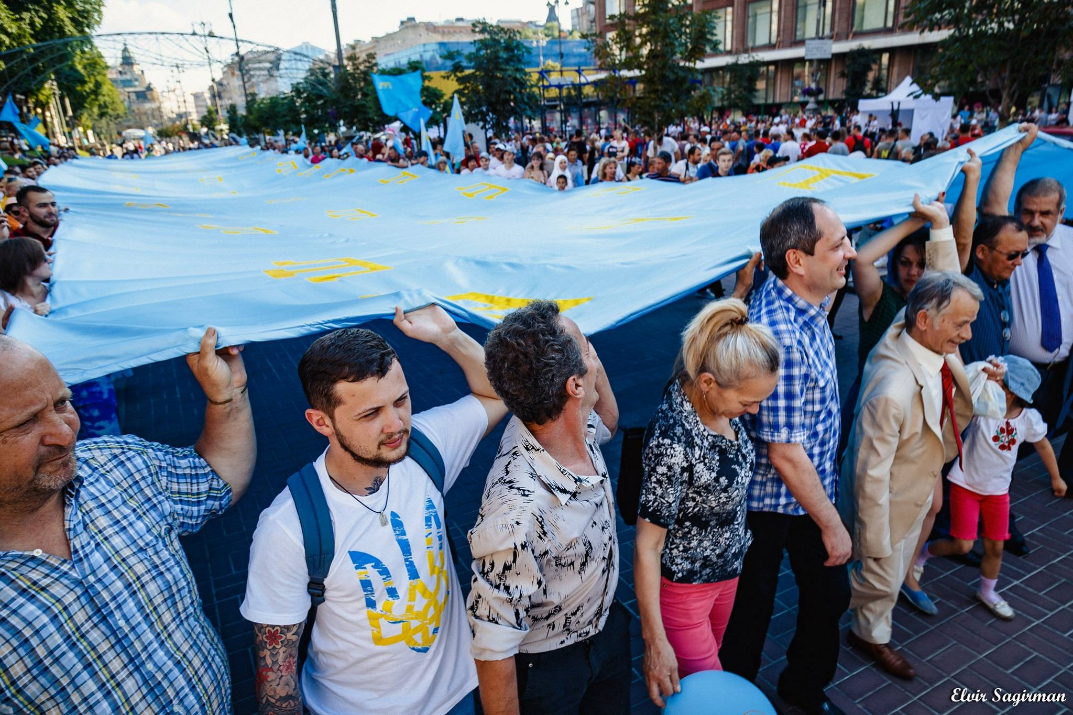Crimean Displaced Persons Help Build a Democratic, Unified Ukraine

Since achieving independence from the Soviet Union 29 years ago today, Ukraine has followed a long and sometimes troubled path to democracy. In that time, Ukrainians of all backgrounds have united to resist corruption and authoritarianism and build a sovereign, democratic and united polity. With Russia’s continued occupation of the Crimean peninsula and the ongoing war of aggression in the Donbas territory, it’s important to highlight the role that internally displaced persons (IDPs) from these territories have played in resisting authoritarianism and strengthening Ukrainian democracy. Despite the numerous challenges that the estimated 1.4 million IDPs continue to face, they have demonstrated an unwavering commitment to the democratic values embodied by Ukrainian independence and the 2014 Revolution of Dignity.
On August 24, 1991, Ukraine’s parliament issued an Act of Independence that declared “from this day forward, only the Constitution and laws of Ukraine are valid on the territory of Ukraine.” Twenty-nine years later, more than 1.4 million IDPs have left their homes in Russian-controlled Crimea and Donbas in search of the society promised by Ukraine’s Act of Independence and the Revolution of Dignity.
However, the communities in which IDPs resettle are often compromised by the consequences of Russia’s conflict in Ukraine, weak local governments, pre-existing systemic inequalities and, most recently, the COVID-19 pandemic. The shortcomings in local governance have led many longtime residents to perceive IDPs not as partners working towards a more democratic Ukraine, but as competitors for basic needs like housing, hospital beds or access to education.
Since the Revolution of Dignity, IRI has partnered with IDPs and local governments to improve re-integration efforts and increase their engagement in political processes. IRI’s initiatives supporting IDPs include combating disinformation through TV and radio advertisements that inform the population about services available to IDPs; educating young IDPs on how to interact with local officials; and improving the capacity of the Mejlis of the Crimean Tatar People – the highest representative body for Crimean Tatars, to better represent the interests of this minority group.
Since the onset of COVID-19, through online Citizen Academies IRI has also worked remotely with Crimean IDPs, who now live in Kherson, the city closest to occupied Crimea. These academies provide IDPs with insights into decision-making processes and tools to communicate their interests to government. Thanks to these academies, Crimean IDPs have developed their own advocacy campaigns to raise awareness of and provide solutions for the problems they face in their new communities.
Here are a couple of examples of the great work being achieved by alumni of these academies:
Olena Povzhyk, Chairperson of the Coalition of IDPs “Usi Svoyi” (“All Their Own”) developed an advocacy campaign to document the permanent and temporary housing records for IDPs in Kherson. As a result, Vsi Svoyi was able to receive funding from the local budget to finance housing for IDPs under the Ministry of Reintegration of Temporarily Occupied Territories and IDPs’ (MTOT) “30/70”program, which funds IDP housing projects that are 30% financed by the city budget and 70% by the MTOT. “We are waiting for final confirmation from the Ministry of Reintegration and aim to provide housing for a multiple families with disabilities,” Povzhyk said.
Mykhailo Batrak, Editor-In-Chief of the Kherson-based internet news site Injir (“Fig”) applied skills gained from the Citizen Academy’s cybersecurity training to facilitate communication between journalists from the Crimean Peninsula and Kherson. “We have journalists working in Crimea and we need a protected system online for systematic communication, thus, we use various encrypted apps and cloud services recommended by IRI to send information to each other,” Batrak said. This media project conducts independent research and covers events taking place in Crimea.
There is still much to be done to achieve the vision of a unified, democratic and inclusive Ukraine. IRI’s work shows that IDPs are a crucial part of the effort to achieve the promise of the Revolution of Dignity, and are undaunted by the challenges they face. Thanks to the tireless work of Olena, Mykhailo and thousands of their compatriots, Ukraine is well on its way to fulfilling the promise of independence.
Top